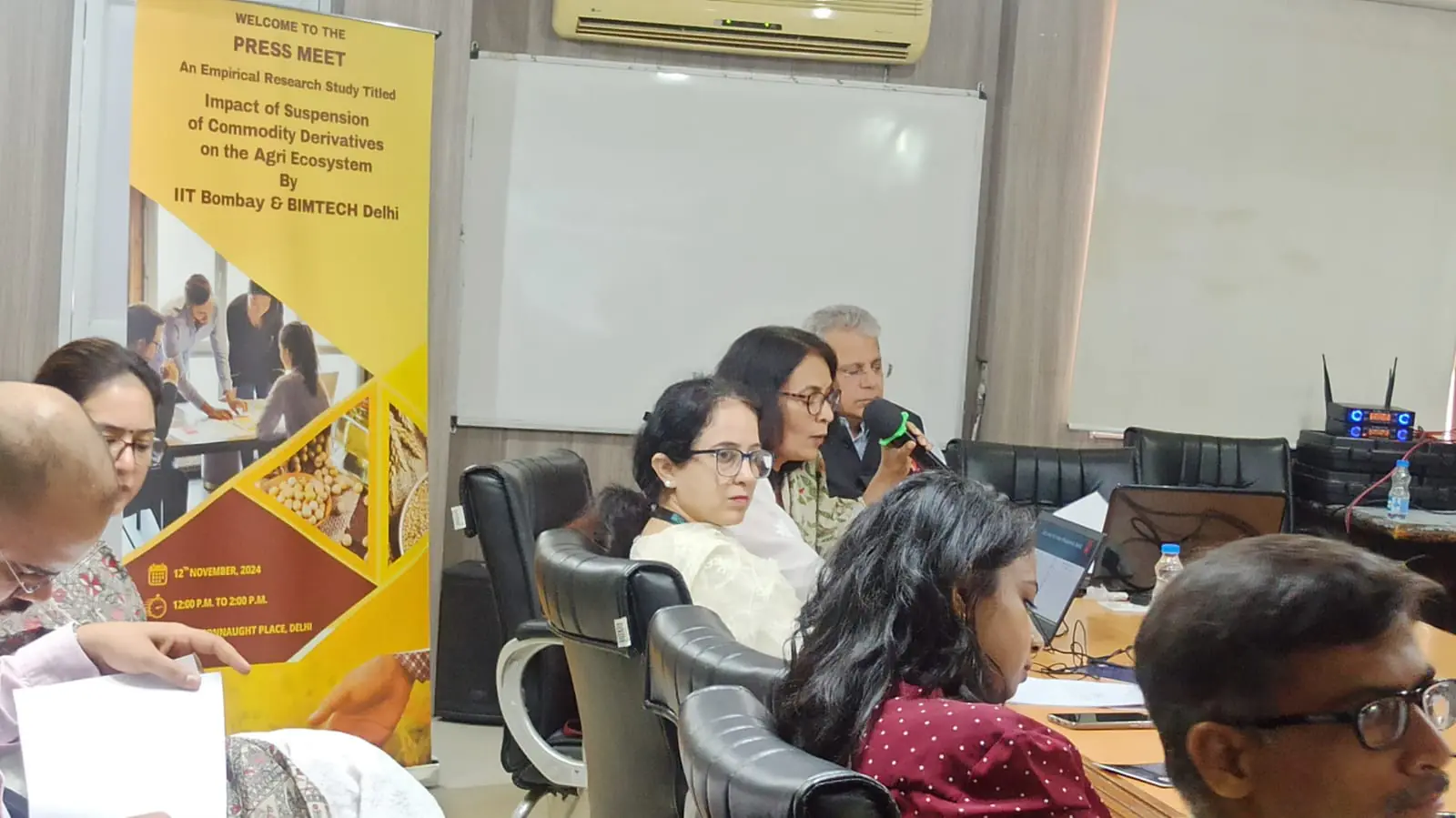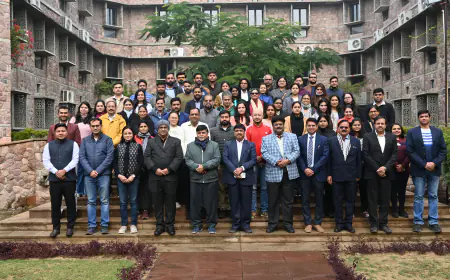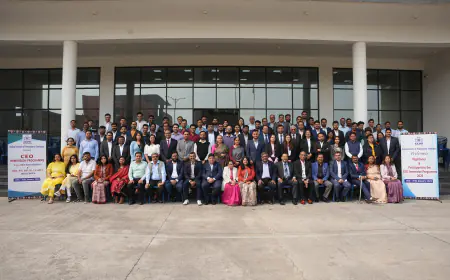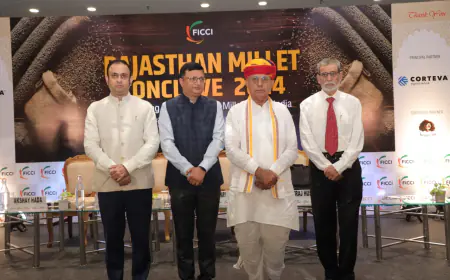• Two studies by BIMTECH and SJMSOM, IIT Bombay, reveal that suspending commodity derivatives in India disrupts price discovery, increases price volatility, and negatively impacts farmers and value chain participants, particularly in edible oils.
National, 16th November, 2024 : Birla Institute of Management Technology (BIMTECH), Noida, one of the leading B-school in India and the Shailesh J. Mehta School of Management (SJMSOM), IIT Bombay conducted two separate studies investigating the impact of the suspension of future derivatives contracts on the commodity ecosystem, value chain, and farmer-producing organization.
BIMTECH study titled- Impact on Suspension of Commodity Derivatives on Commodity Market Ecosystem is based on empirical data from January 2016 to April 2024 for Mustard Seed, Soybean, Soy Oil, and Mustard Oil along with an in-depth interview with FPOs. It conclusively reports that suspension of ETCDs (Exchange Traded Commodities) leads to the absence of reference price for the physical market and that in turn results in scattered and higher price variance across mandis. The analysis also shows that prices have increased across edible oil categories during the post-suspension period, and retail consumers are paying even higher prices in the post-suspension period.
SJMSOM, IIT Bombay study titled - Impact of Suspension of Commodity Derivatives on the Agri Ecosystem combines primary and secondary research through survey and in-depth interviews of physical market participants (including farmers and FPOs) in three states i.e. Maharashtra, Rajasthan, and Madhya Pradesh with focus on Mustard Seed, Soya Oil, Soybean, Chana and Wheat. The study underlines that derivatives contracts serve as an important tool for price discovery and price risk management for farmers/FPOs and other value chain participants in managing the price volatility and inherent risks in the agro economic space.
In 2021, SEBI suspended derivatives trading in seven agricultural commodity/commodity groups, in what can be termed as largest-ever clampdown on the Indian commodity derivatives market since the modern electronic versions of commodity exchanges came into existence in 2003. Though a specific reason wasn’t attributed to suspension, however, it is widely believed that the decision was taken to tame the rising prices due to the underlying belief that derivatives trading contributes to price rise. In this context, the two esteemed institutes of India undertook a comprehensive study, evaluating the impact of suspension of commodity derivatives on the commodity ecosystem.
The BIMTECH study, conducted by Dr Prabina Rajib, Director, BIMTECH, Dr. Ruchi Arora, Associate Professor (Finance) from BIMTECH & Dr Parama Barai, Associate Professor from IIT, Kharagpur focused on three perspectives: -
• Impact of unavailability of price anchors for local mandis
• Impact on edible oil prices at wholesale and retail level.
• Hedging efficiency in the international markets for the suspended commodities
Commenting on the study Prof Prabina Rajib, Director, BIMTECH said, “Periodic suspension of commodity derivative contracts has been a recurring theme in India that is not only hampering the growth of the derivative sector but also the growth of the overall commodity ecosystem. However, world-over commodity exchanges have continued to offer uninterrupted commodity derivatives contracts even in the face of supply-demand mismatch and price variations. Hence, it was intriguing to deep-dive into the underlying prevalent belief system behind suspensions in India via empirical research and understand its impact on the foremost entity – our farmers and value chain participants. Our study articulates that the belief that derivatives futures trading leads to price inflation may be misplaced. Our analysis of retail and wholesale prices determines that specifically for edible oils, not only have prices increased across categories during the post-suspension period, retail consumers are paying even higher prices.”
The IIT Bombay Shailesh J Mehta School of Management study conducted by Prof Sarthak Gaurav, Associate Professor, and Prof Piyush Pandey, Assistant Professor (Finance) focused on four specific objectives.
• To examine how price discovery and risk hedging were affected following the suspension of five ETCDs.
• To examine the relationship between futures and spot prices, volume, and volatility and to present commodity-specific price variation associated with the suspension.
• To understand if speculation in specific suspended commodities is even a matter of concern.
• To gain insights about futures trading for physical market participants including the farming community whose experiences in the context of futures trading remain understudied.
Research finds that there is no evidence of a positive relationship between Commodity Futures trading and spot market prices for five suspended commodities, suggesting that the relationship between futures trading and food inflation for the commodities and time period of analysis is misplaced. In fact, the study based on statistical analysis of commodity futures and spot prices data and surveys in three states - Maharashtra, Madhya Pradesh, and Gujarat - firmly establishes that prices of both suspended and non-suspended commodities remained high after the suspension and that both domestic and international demand and supply factors influence retail prices of commodities.
Commodity derivative contracts play an important role in price discovery and risk hedging, which is apparent from the analysis. The suspension of futures commodities trading has negatively impacted better price realization because of the absence of reference pricing mechanism and thus also disrupted price risk management practices of participants in the commodity value chain. Consequently, the agri-ecosystem in whole has been affected due to hurdles in market access, participation and securing fair prices.
Commodity derivatives are market driven tools, that serve as shields during volatile times – safeguarding the interest of value chain participants and bringing sustainability to the commodity markets. Since these are relatively new tools, there is understandably a certain level of trepidation about them. However, the Government should utilize these tools to help the farmers manage their price risk even in the face of price volatility, encouraging them to actively participate, thereby boosting volumes and bolstering market confidence.



























































